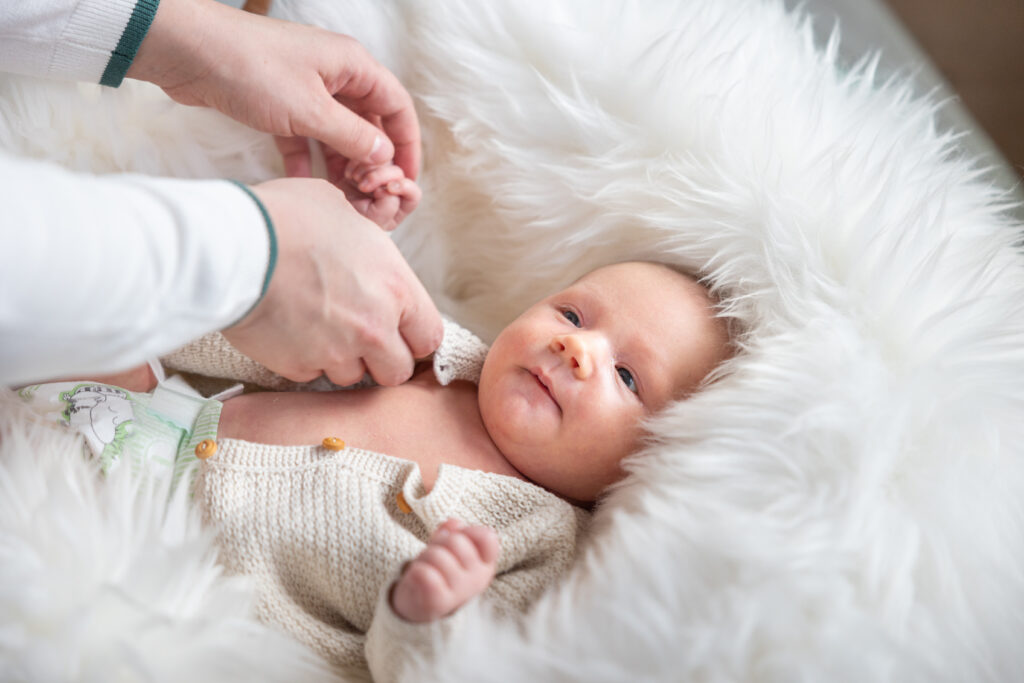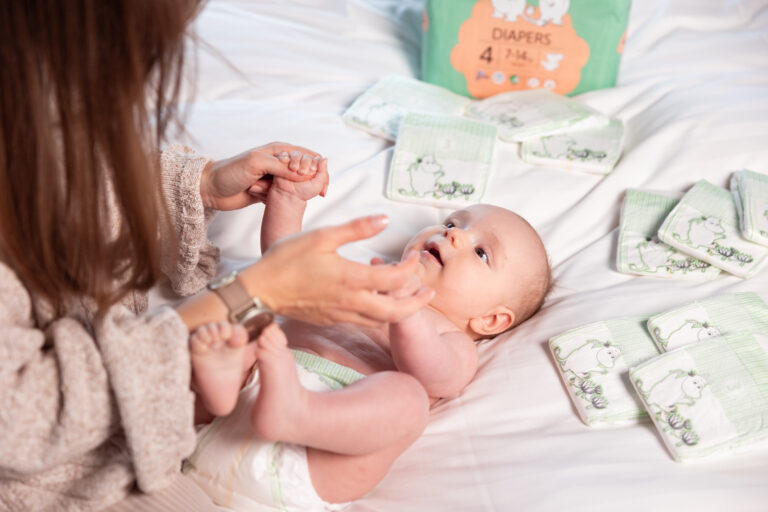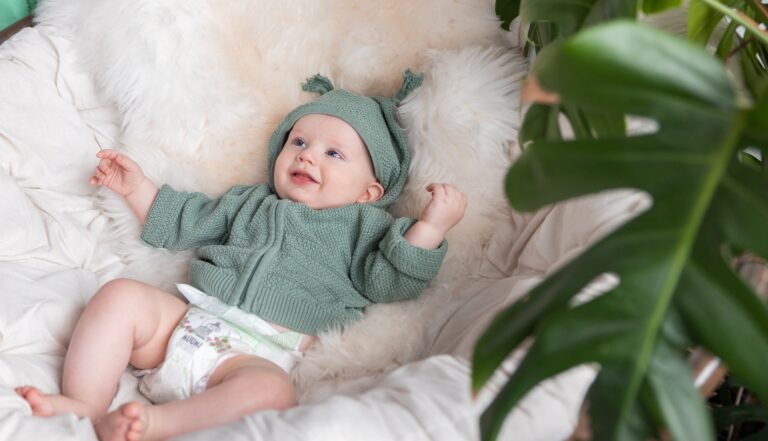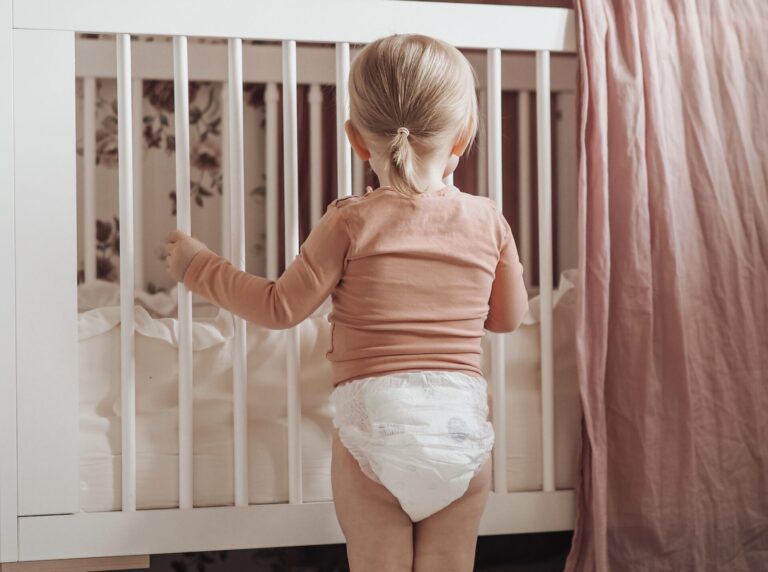The arrival of a baby in the family is a unique and joyful event, but it also brings with it new challenges. One of the biggest challenges is to understand and manage the newborn’s sleep rhythm. In this article, we give parents tips for newborn sleep, how to support and improve the baby’s sleep rhythm, so that both the baby and the parents get the rest they need.
Understanding the newborn’s sleep rhythm
A newborn’s sleep pattern can seem unpredictable and confusing at first. At this stage, the baby may sleep up to 16–18 hours a day, but often in short periods. A baby’s sleep does not follow the same patterns as an adult’s, because the baby’s sleep stages are different and develop over time. It is important to understand that the baby’s sleep rhythm and needs are constantly changing. In the first weeks, the baby will probably wake up to eat every 2-3 hours, regardless of day or night. This is due to the baby’s small stomach, which needs regular filling. In addition, newborns spend a large part of their sleep in the REM sleep stage, which is very important for brain development.
It’s easy to wake up from REM sleep, so don’t worry if your baby wakes up often. Remember that every baby is an individual and develops at their own pace, and there is no “normal” sleep pattern. The best thing you can do is to be flexible and adapt to your baby’s sleep and wake rhythm.
Read more about baby’s sleep at 1 month here!
Tips for a safe sleeping environment
Several requirements are set for a child’s safe sleeping environment. First of all, when the baby sleeps, it is recommended that they are on their back, as this reduces the risk of suffocation. Also pay attention to the hardness of the mattress: it is good for the baby to sleep on a hard and flat surface that supports their growing spine. The baby bed should not be filled with unnecessary padding, such as pillows, blankets or soft toys, as they can pose a risk of suffocation.
Check that the sides of the crib are at a suitable distance from each other so that the baby cannot get between them. Temperature is also important. Experts recommend a room temperature of 18–20 degrees, because a room that is too warm can lead to overheating. The lighting should be adjusted so that it is dark enough at night, while it is bright during the day. This supports the development of the baby’s sleep rhythm. Remember that whenever it comes to baby safety, it’s better to overdo it than take unnecessary risks.
Such discernment can help improve sleep quality for all family members.
Night feeds and sleep quality: How are they related?
Night feeds are important for the baby’s nutrition and development, but they can challenge the parents’ sleep rhythm. Newborns wake up to eat every 2-4 hours and as their stomachs gradually grow, they are able to take longer breaks to eat. As the number of night feedings decreases, the quality of sleep of both the baby and the parents improves.
At this stage, it can be helpful to learn to distinguish when the baby wakes up really hungry and when they just need comfort or a diaper change. Such discernment can help improve sleep quality for all family members. Understanding the connection between sleep and nutrition is essential for achieving a good sleep rhythm. You can start this learning process by keeping an eye on your baby’s eating and sleeping rhythms and adjusting them as needed. This lays a good foundation for sleep school later on.
Although night feeds can be demanding, remember that this is only a temporary phase in your baby’s life. Be kind to yourself and remember that every baby and family is different. These guidelines are applied to the individual needs of each family and baby.
Starting sleep school: When is the right time?
Sleep schooling is a method that you can use to teach your baby how to sleep for longer periods and wake up less during the night. There is no single right time to start sleep school, because every baby is an individual and ready at their own pace. However, the general recommendation is not to start sleep schooling until the baby is 4-6 months old. For babies younger than this, night feeds are still necessary and their sleep needs vary greatly.
Starting sleep school should be based on the child’s needs, not the parents’ wishes or societal pressures. It is important that the baby is given time to adjust to the change, and that the baby is healthy when sleep schooling is started. Sleep school is often a difficult project for parents, so it is important that sleep school starts when the family is ready for it and family members can support each other in the process. The aim of the sleep school is that the child’s day and night rhythm improves, as a result of which the whole family gets a restful sleep.
Read more about sleep school here!
The routine can support the well-being and quality of sleep of both the baby and the parents.
How to support newborn sleep: Best practices
By stimulating the baby during the day, you can promote their sleep at night. Keep the child’s waking hours noisy and bright during the day so that they learn to distinguish night from day. This helps to develop their internal clock. At night, try to keep the activities as minimal as possible, so that the baby understands that the night is for rest. Avoid long games and playtimes at night. If your baby wakes up in the night, keep the lights dim and the sounds low, and soothe them back to sleep as quickly as possible.
Babies are also soothed by a regular routine. Try to create an evening and bedtime routine that includes rituals such as bathing, a bedtime story, and goodnight wishes. Although at first it may seem that the baby does not follow any schedule, finding your own daily rhythm and routine can help the baby learn to eat and sleep more predictably. This can support the well-being and quality of sleep of both the baby and the parents. Each family must find a working rhythm and routines according to their own schedules and life situation. Remember that you are not alone, but you can always ask for advice and help from, for example, a counseling center.
More tips for better sleep can be found here!
Common sleep disorders in newborns: What to look for?
Sleep disorders in newborns can manifest in different ways during the first months of life, such as difficulty falling asleep, short sleep periods or frequent night awakenings. This irregular sleeping pattern is common at this age, but there are also a few unusual sleep disorders that require closer attention.
One such unusual sleep disorder is sleep apnea, which occurs when a child takes short pauses in breathing during sleep. This can lead to frequent night wakings and daytime fatigue. If you notice that your child is shaking during sleep, it can also indicate possible neurological development problems.
Colicky or crying babies can suffer from sleep disturbances that typically start around 2-3 weeks of age, and this can continue until 3-4 months of age before the situation starts to ease.
If you notice that your newborn is behaving differently or has continuous sleep problems, you should contact a healthcare professional. Parents do not have to try to solve sleep problems on their own, rather, it is always better to get professional advice.
The role of parents in the sleep rhythm of the newborn
The role of parents in a newborn’s sleep rhythm and sleeping habits is significant. First of all, the parents’ own sleep rhythms and habits directly affect the baby’s sleep routines. A balanced and regular daily rhythm of the parents creates a safe and predictable environment for the baby, which helps them learn their own sleep rhythm and recognize the differences between night and day.
Secondly, the role of parents is to create a safe and comfortable sleeping environment for the baby. This applies to both the concrete environment, such as the baby’s bed and its temperature, as well as the baby’s evening routines, for example bedtime stories or tender cuddling moments.
Thirdly, the parent’s task is to monitor the baby’s sleep and react to possible deviations or problems, such as sleep disorders.
Fourth, the parents’ empathetic and warm attitude towards the baby’s nighttime awakenings and restless dreams strengthens the baby’s sense of security and builds their stress tolerance.
Lastly, the parents’ role is to create a balance between the baby’s sleep and wakefulness needs and to coordinate this with the rhythm of their own life. Practicing sleeping with your baby requires a lot of patience and flexibility, but it lays the foundation for your baby’s healthy growth and development.

Sleep and baby’s development: Why is it important?
Sleep plays a key role in your baby’s physical and mental development. Not only does it give your baby energy for the day’s activities, it is also an important part of the development of their brain. During sleep, a lot of learning and memory processing takes place in the brain, which supports your baby’s cognitive development. During sleep, their brain processes what they have learned during the day, links it together and stores it in long-term memory. These processes support your baby’s learning, problem solving and memory development.
In between practising motor skills such as turning, sitting and walking, sleep provides the necessary recovery time for your baby’s muscles. Sleep also acts as an immunity booster, improving the baby’s resistance to disease. The importance of sleep for a baby’s growth and development cannot be overemphasised. Taking care of sleep is one of the most important things parents can do to support their child’s well-being. Good sleep routines and habits are a gift that will stay with your child throughout their entire life.
Handling insomnia with your baby
Constant insomnia can be exhausting for both baby and parents. Sometimes the insomnia is caused by physical ailments, such as teething or stomach pains, and sometimes it may be a new developmental stage, such as learning to crawl or walk, that wakes the baby. It is important to remember that all babies wake up at night. What is more important than the number of night wakings is how quickly and easily the baby is able to return to sleep.
A well proven way to help your baby with insomnia is to keep nights as quiet as possible and days as active as possible. Comfort and soothe your baby at night with as little movement and light as possible to help them associate the night with sleep. If insomnia affects the baby or parents during the day, it is advisable to consult a child health clinic or a doctor. All children and families are individual, so there is no one solution that works for everyone. A specialist will be able to offer support and advice tailored to your family’s needs.
Good sleep routines and habits are a gift that will stay with your child throughout their entire life.
Creating sleep routines: How to start?
Sleep routines are part of the daily routine and are very useful for improving your baby’s sleep quality. Your baby’s own sleep routine starts to form around 6-8 weeks of age. This does not mean that your baby will sleep through the night, but their wake and sleep times will become more predictable. Routines should start by making days bright and active and nights dark and calm. For example, you could keep the curtains open during the day and dim the lights at night. Avoid overly strict bedtimes and wake-up times for the first few months.
Instead, you can try a routine like this: in the evening, about an hour before bedtime, start a calming routine. This could include a warm bath, an evening snack, getting into your nightclothes, quiet play and finally a good night’s sleep. However, routines should not become a burden. Flexibility is key, as at this age babies’ rhythms can change rapidly. The key is to keep routines consistent and relaxed to support your baby’s sleep. Sleep is not an achievement, but an opportunity for rest and recovery.
Order a free Diaper Hero diaper sample
At this stage, when you’ve mastered the secrets of newborn sleep, it’s time to think about other needs, such as diaper selection. We recommend trying Moomin Baby diapers, which are designed to care for your baby’s delicate skin and work together to support their growth and development.
These Finnish, environmentally friendly diapers are made from safe and high quality materials. They are also effective at absorbing moisture, preventing skin irritation and helping your baby stay dry and happy – day and night.
We welcome you to try Moomin Baby diapers by ordering a free Diaper Hero diaper sample here!
Give your baby daily comfort and long-term protection, and you can concentrate on enjoying your everyday life as a new parent. Order a sample now, and let the Moomin Baby diaper keep your little one dry day and night – so you can focus on enjoying unique moments and creating new memories with your newborn.










